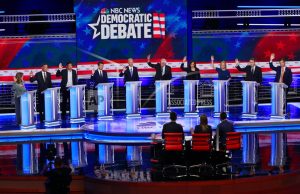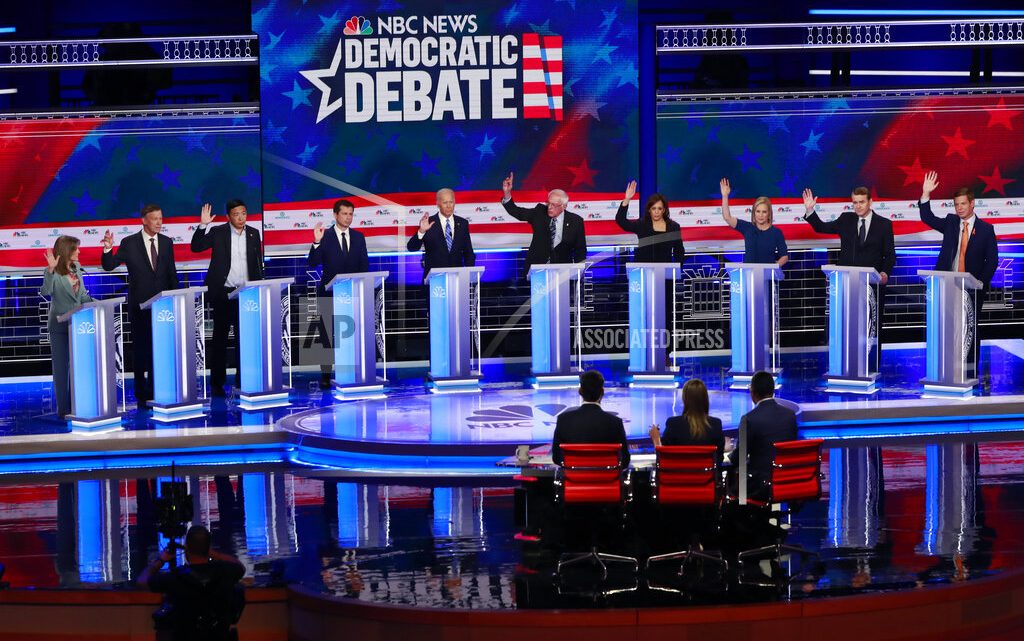Rivals target Biden as Democrats’ rifts emerge on age, race
By JUANA SUMMERS and STEVE PEOPLES Associated Press
MIAMI (AP) — Democratic divisions over race, age and ideology burst into public view in Thursday night’s presidential debate, punctuated by a heated exchange between former Vice President Joe Biden and California Sen. Kamala Harris.
It was one of several moments that left the 76-year-old Biden, who entered the night as his party’s early front-runner , on the defensive as he works to convince voters he’s still in touch with the modern Democratic Party and best-positioned to deny President Donald Trump a second term.
“I do not believe you are a racist,” Harris said to Biden before criticizing his record of working with Democratic segregationist senators on non-race issues as “hurtful.”
Biden called Harris’ criticism “a complete mischaracterization of my record.” He declared, “I ran because of civil rights” and later accused the Trump administration of embracing racism.
The night marked an abrupt turning point in a Democratic primary in which candidates have largely tiptoed around each other, focusing instead on their shared desire to beat Trump. With millions of Americans peeking inside the Democrats’ unruly 2020 season for the first time, the showdown revealed deep rifts eight months before primary voting begins.

Democratic presidential candidates, author Marianne Williamson, former Colorado Gov. John Hickenlooper, entrepreneur Andrew Yang, South Bend Mayor Pete Buttigieg, former Vice President Joe Biden, Sen. Bernie Sanders, I-Vt., Sen. Kamala Harris, D-Calif., Sen. Kirsten Gillibrand, D-N.Y., former Colorado Sen. Michael Bennet, and Rep. Eric Swalwell, D-Calif., raise their hands when asked if they would provide healthcare for undocumented immigrants, during the Democratic primary debate hosted by NBC News at the Adrienne Arsht Center for the Performing Arts, Thursday, June 27, 2019, in Miami. (AP Photo/Wilfredo Lee)
The showdown featured four of the five strongest candidates — according to early polls, at least. Those are Biden, Sen. Bernie Sanders of Vermont, Mayor Pete Buttigieg of South Bend, Indiana, and Harris. Massachusetts Sen. Elizabeth Warren, who debated Wednesday night, is the fifth.
There are so many candidates lining up to take on Trump that they do not all fit on one debate stage — or even two. Twenty Democrats debated on national television this week in two waves of 10, while a handful more were left out altogether.
Trump, who was attending the Group of 20 summit in Japan, still found time to weigh in on the debate and jab his rivals, claiming it didn’t go well for Biden or Sanders. Trump tweeted Friday that he heard it was “not a good day” for them.
The level of diversity on display on the debate stage was unprecedented for a major political party in the United States. The field features six women, two African Americans, one Asian American and two men under 40, one of them gay.
Harris is the only African American woman to qualify for the presidential debate stage and showed she could land a forceful attack on rivals.
Any of the three women featured Thursday night would be the first ever elected president. Yet in the early days of the campaign, two white septuagenarians are leading the polls: Biden and Sanders.
Buttigieg, a 37-year-old gay former military officer, is four decades younger than Sanders and Biden and has framed his candidacy as a call for generational change in his party.
He displayed a fluency on a range of policy issues and hit hard on efforts by Republican Trump to stifle the flow of illegal immigration at the Mexican border.
“For a party that associates itself with Christianity to say it is OK to suggest that God would smile on the division of families at the hands of federal agents, that God would condone putting children in cages,” that party “has lost all claim to ever use religious language,” he said.
The party’s broader fight over ideology took a back seat at times to its racial and generational divisions, which also flared when the discussion turned to health care.
Sanders, the self-described democratic socialist , slapped at his party’s centrist candidates, vowing to fight for “real change.” He raised his hand to indicate he would give up his private insurance coverage in favor of a government-financed plan.
Most of the candidates on stage, including Biden, didn’t join him.
While many candidates, including Biden, embrace at least some version of Sanders’ “Medicare for All” proposal , the former vice president also defended the role of private insurance, praising its role in the aftermath of the car accident that killed his wife and daughter and left his sons injured decades ago.
Along with Medicare, Buttigieg defended private insurance, too, but he also said, “We can’t just be relying on the tender mercies of the corporate system.”
Buttigieg’s night was defined in part by trouble back home that has represented the most significant leadership test in his young political career. The fresh-faced mayor faced tough questions about a recent police shooting in his city in which a white officer shot and killed a black man. He said an investigation was underway, and acknowledged the underlying racial tensions in his city and others.
“It’s a mess,” he said plainly, noting that such issues have plagued communities across America. “We’re hurting.”
He sidestepped pointed calls to fire his police chief, calling instead for a time when white and black people would react the same way when confronted by police.
Little-known California Rep. Eric Swalwell, who is just 38 years old, was among Buttigieg’s chief critics. He also took a swipe at Biden’s advanced age.
Either Biden or Sanders would be the oldest president ever elected.
“Joe Biden was right when he said it was time to pass the torch to a new generation of Americans 32 years ago,” Swalwell jabbed.
Biden responded: “I’m still holding onto that torch.”
Others on the stage Thursday night included Sens. Kirsten Gillibrand of New York, who tried to elbow her way into the packed debate at times, Sen. Michael Bennet of Colorado, New York businessman Andrew Yang and author and social activist Marianne Williamson.
The showdown played out in Florida, a general election battleground that could well determine whether Trump wins a second term next year.
Biden sought to sidestep the intraparty divisions altogether, training his venom on Trump.
“Donald Trump thinks Wall Street built America. Ordinary middle-class Americans built America,” he said, adding, “Donald Trump has put us in a horrible situation. We do have enormous income inequality.”
Biden downplayed his establishment leanings at times. Along with the other candidates on stage, he raised his hand to say his health care plan would provide coverage for immigrants in the country illegally.
Former Colorado Gov. John Hickenlooper predicted that an aggressive lurch to the left on key policies would ultimately hurt Democrats’ quest to defeat Trump.
“If we don’t clearly define we are not socialists, the Republicans are going to come at us every way they can and call us socialists,” he warned.
Their first round of debates is finished, but the real struggle is just beginning for most of the candidates.
All will work aggressively to leverage their debate performance and the related media attention to their advantage in the coming days. There is a real sense of urgency for more than a dozen who fear they may not reach donor and polling thresholds to qualify for later debates.
Should they fail to qualify, and many will fail, this week’s debates may have marked the high point for their personal presidential ambitions.
___
Peoples reported from Washington. Associated Press writer Colleen Long in Washington contributed to this report.





No Comment